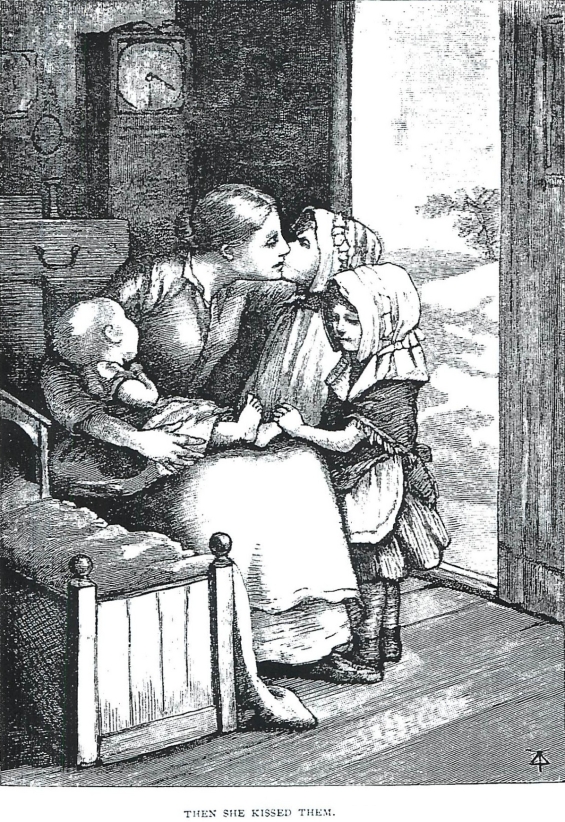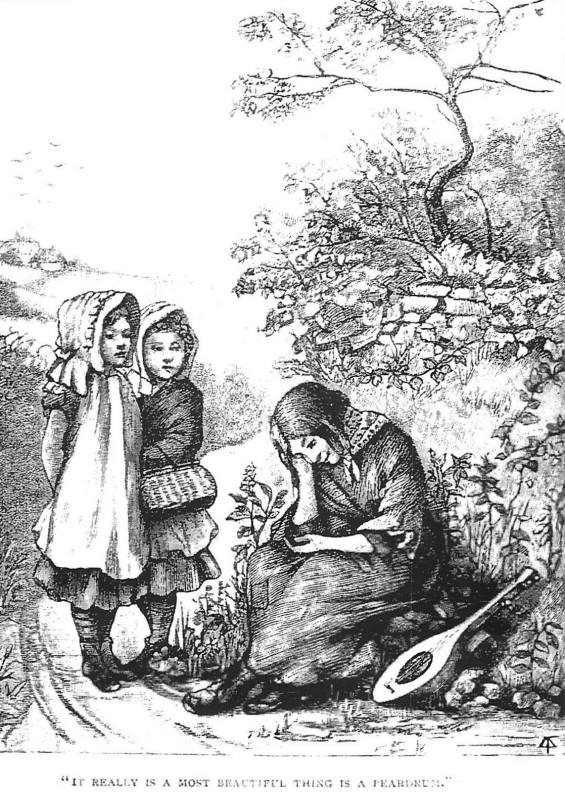
 The SFFaudio Podcast #162 – The New Mother by Lucy Clifford, read by Heather Ordover (of Craftlit). This is a complete and unabridged reading of the short story (21 Minutes) followed by a discussion of it by Jesse, Tamahome, Julie Davis, and Heather Ordover.
The SFFaudio Podcast #162 – The New Mother by Lucy Clifford, read by Heather Ordover (of Craftlit). This is a complete and unabridged reading of the short story (21 Minutes) followed by a discussion of it by Jesse, Tamahome, Julie Davis, and Heather Ordover.
Talked about on today’s show:
Brownies!, The Mote In God’s Eye by Larry Niven, what is the lesson of The New Mother, naughtiness will be punished without chance of redemption, Lucy Clifford’s children were good, the big people, Coraline by Neil Gaiman, button eyes, crafty, The Father Thing by Philip K. Dick, Philip K. Dick had two fathers, glass eyes and a wooden tail, stand the baby on it’s head, “don’t talk to strangers”, free range children, scared straight, dancing dogs, hopelessness, don’t give in to temptation, “listen to your mother”, the magic cupboards, cargo cult mindset, is the girl the devil?, Something Wicked This Way Comes, creepy warnings, has the girl been the victim of a curse?, a moral story, evil things sometimes look attractive, Anyhow Stories: Moral And Otherwise, the Wikipedia entry for Coraline, The Father Thing and Coraline have hope, horror, The Shining by Stephen King, G.K. Chesterton “fairy tales are more than true”, The Hanging Stranger by Philip K. Dick, To Kill A Mockingbird, Stand By Me, BB guns vs. aliens, did Dick read The New Mother?, Beyond The Door by Philip K. Dick, fantasy, the world is a magical place for children, the magic of housework, mom’s like God providing manna, the “good clock” that tries to keep going, frozen peas and creamed corn, the McCarthy era, The Twilight Zone, The Monsters Are Due On Maple Street, Invasion Of The Body Snatchers, child abuse, untrustworthy parents, “this is real”, stepping into adulthood, 19th century, 1950s, Coraline’s ineffectual parents, the Turkey and Blue Eyes, what happened to the turkey?, what’s up with the peardrum?, the Dictionary Of American Regionalisms, horrormasters.com, “it’s too heavy“, deception vs. self-deception, when do we learn do we naughty?, or do we learn it?, is it a game?, naughty vs. evil, reverse psychology, Tom Sawyer, a dead rat on a string, what’s the deal with the missing father?, fairy tales, Persuasion by Jane Austen, away at sea, fun garages, the feeling of bigness, Julie makes it all sound homey, Philip K. Dick’s father was a WWI veteran, pastoral vs. mechanized hell, Vietnam veterans, the new father in Coraline, the s-word, the movie of Coraline, a giant spider with bony arms, Neil Gaiman’s inspirations are classic literature, The Graveyard Book, The Jungle Book, Silas, Nobody Owens’ governess is named Mrs. Lupescu, Mr. Lupescu by Anthony Boucher, Weird Tales, Neil Gaiman is a fantasy master like J.R.R. Tolkien or Robert E. Howard, The Sandman, Aladdin, The Sandman: Season Of Mists, rescuing readers with Neil Gaiman, the teacher’s conundrum, there’s nothing better for a young reader than comics, Red Nails by Robert E. Howard, comic adaptations, don’t play down to your audience, Gargoyles, William Shakespeare, don’t pile on memorization, pile on fun, everything of value is learned through story, if you invert everything the girl in The New Mother you still don’t know what’s going on, is she just evil?, did she sit upon a baby?, are the two dogs the man and woman missing from the box?, many locks and many keys, unanswered questions, “perhaps you’ve lost yourself”, levels of naughtiness, being naught isn’t following orders, truth in advertizing, critical thinking, Grimm’s fairy tales, the etymology of “grim”, the University of Arizona, Grima Wormtongue, Harry Potter, Grimm, Once Upon A Time, Lee Arenberg, “to wend the grim tooth” (to recourse to harsh measures).


Posted by Jesse Willis
I think you guys were overthinking this story.
I saw this as Lucy Clifford writing in the style of a Victorian moral fable, but twisting it to be a spooky “campfire story” for good children (as Heather aluded to)- not necessarily with a triumphal/arrogant tone, but a story about extreme bad choices and the scary consequences.
There is a lot of folktale logic at work in this story as well- the rules of the universe are inscrutable but inviolate, the supporting characters are almost forces of nature, and moral choices have clear repercussions. (You were also on to something when you described the Real mother’s description of the New mother- it is proposed as a sad but inevitable fate when children become hardened “naughty children.”)
The girl with the pear drum certainly is a devil-character, but has a lot of “fey” qualities too (“wrongness” of dress, speech, behavior) which tips off the audience that she is not to be trusted (as indeed we find out at the end, she has tricked the children into driving their own mother away).
I didn’t see the silly names of the protagonists as laziness but rather as a nod to the affectionate names that a family uses in the safety of the home – it adds to the warm loving atmosphere that the audience sees is directly attributable to the Real mother.
Note also that the ending is very folktale-like: the children do not die, it isn’t important how much time passes, but they are stuck in this exile: a chilling moral about the irrevocable loss caused by our bad choices (there’s a certain deep wisdom there- even when we repent/make amends, we cannot go back in time and undo our choices).
Also, as you all pointed out, the story is not for the very young: it is meant for children who know the basic outlines of a moral fable and can both laugh at the children’s foolishness (“We do so enjoy crying!”) and also enjoy a shiver at the idea of a “New mother” taking over to punish wicked children.
Honestly, I don’t think I would have enjoyed this story as a kid (even “Coraline” would have been pretty scary for a sensitive soul like me) but I LOVED “The New Mother” – thank you for introducing me to it!